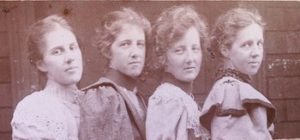
*The Whitman Sisters quartet is celebrated on this date in 1900. They were four Black sisters who were stage stars of 20th-century Black Vaudeville.
The Whitman Sisters ran their performing touring company for over forty years from 1900 to 1943, becoming the longest-running and best-paid act on the Theater Owners Booking Association circuit. The sisters were the daughters of Reverend Albery Allson Whitman and Caddie Whitman (White), who lived in Ohio, Arkansas, and Kansas before settling in Atlanta, Georgia. They included Mabel “May," Essie “Essie Barbara,” Alberta "Bert," and Alice. The sisters had an older brother.
Reverend A. A. Whitman became known as the "Poet Laureate of the Negro Race." Their father taught the sisters to sing religious songs and dance to accompany them on evangelical tours. Around 1899, Mabel and Essie began performing as the Danzette Sisters. They were invited to perform in New York by George Walker. Still, their father and manager insisted they stay to finish their education, and the sisters continued performing in the South.
After their father died in 1901, Mabel, Essie, and Alberta formed the Whitman Sisters' Novelty Act Company in Augusta, Georgia, and the twelve-strong Whitman Sisters' New Orleans Troubadours in 1904. The sisters were light-complexioned, their mother was white, and they were occasionally obliged to perform in blackface. They were described as "bright, pretty Mulatto girls" with "wonderful voices." Alberta ("Bert") performed regularly as a male impersonator.
They moved their base to Chicago in 1905, and the youngest sister, Alice, joined the company around 1910. Mabel Whitman managed the company after her mother died in 1909, and in 1910, she organized Mabel Whitman and the Dixie Boys and toured the US and (reputedly) Europe. They were one of the highest-paid acts in the Vaudeville circuit. Many other actors started or advanced their careers with the Whitman Sisters' company. People of all races enjoyed their show. Even after Vaudeville was no longer in its prime, it continued to perform in theaters and churches nationwide. All types of audience members admired them." A typical show included "jubilee songs and coon shouts, cakewalk, and breakdowns, comedians, midgets, cross-dressers, beautiful dancing girls, pickaninnies, a jazz band."
Other notable performers in the company at various times included Leonard Reed, Willie Bryant, Jeni Le Gon, Count Basie, Lonnie Johnson, and Bill Robinson. Despite their forty years of popularity, information about them all but disappeared. They left no film, sheet music, and close to no records, though Essie made some recordings for Black Swan and Paramount in the early 1920s.
Mabel Whitman died in 1942; the surviving sisters were interviewed in the 1960s by Jean and Marshall Stearns, who included a chapter about the Whitmans in their work Jazz Dance. The efforts of African American Theater Studies scholars uncovered their full role. After Essie retired from performing, she became a lay preacher in Chicago. She was married three times and died at 80 in a house fire in 1963. Alberta died in Atlanta in 1964, and Alice died in Chicago in 1968. Alice's son, Albert "Pops" Whitman, became a noted tap dancer in his own right.
Professor Nadine George-Graves: The Royalty of Negro Vaudeville: The Whitman Sisters and the Negotiation of Race, Gender and Class in African American Theatre, 1900-1940. 2000.